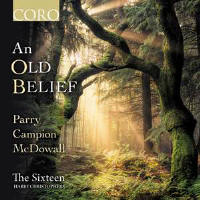Texte paru dans: / Appeared in: |
|
|
Outil de traduction |
|
|
What might at first glance seem like a disparate programme of medieval carols, Renaissance lute songs, Romantic motets and 20th-century anthems (including a new work by Cecilia McDowall) is shrewdly bound together by common themes of valediction, redemption and consolation, connected by a range of texts from the Early Fathers to the Renaissance. The four medieval carols – Deo gracias, Anglia, Benedicite Deo, Saint Thomas honour we and O blessed Lord provide one level of more rhythmical diversion, and this is complemented by a second, more euphonious level of selected airs from Thomas Campion’s Two Bookes of Ayres from the early 17th century, one of them, ‘Never weather-beaten sail’, furnishing a strategic comparison with one of Parry’s Songs of Farewell. The first substantial item in the programme, Howells’s motet Take him, earth, for cherishing, is a beautifully measured performance of the composer’s interpretation of Prudentius’s fourthcentury words. Christophers brings flexibility to Howells’s liquid counterpoint and the shifting sands of the vocal textures are handled by conductor and choir with an impressive legerdemain, which allows the wonderful diatonic climax in B major, ‘Take, O take him, mighty Leader’, to shine through with truly moving impact. Another contemplative contemporary piece, McDowall’s ‘An unexpected shore’, the first of three movements from Good News from New England, charts a tonal path which, in moving from A major to G, embodies the sense of divine providence as seen through the eyes of William Bradford, governor of Plymouth Colony. Its sense of hope shares much with John Gibson Lockhart’s ‘There is an old belief’ in Parry’s cycle of motets. By far the most significant place on this album, however, is occupied by Parry’s Songs of Farewell and, as the final ‘item’ in the programme, its valedictory essence has a special intensity. Christophers’s attention to detail is, of course, fastidious, and there is much to admire in the unforced shifting tempos and moods of the first motet, ‘My soul, there is a country far beyond the stars’, and the self-examination of the second, ‘I know my soul hath power to know all things’, whose ending is especially poignant. After the simplicity of Campion’s exquisite air, Parry’s more symphonic realisation of ‘Never weather-beaten sail’ seems that much more miraculous in its complex five-part counterpoint and passionate diatonic dissonance. The tempo of ‘There is an old belief’ is slower than many other interpretations I’ve heard of this six-part masterpiece, but many of the affecting harmonic nuances benefit from this more measured treatment, above all the latter part, with its powerful sequence of pedal notes and accumulation of multiple suspensions. This is also true of the opening of the seven-part setting of John Donne’s sonnet ‘At the round earth’s imagined corners’, though there is more room for dramatic contrast in the ensuing episodes, notably in the more urgent ‘But let them sleep, Lord’. The increasing forces of the motets somehow seemed to invite Parry to explore the innermost powers of his Romantic genius, and this is palpably demonstrated in the final, double-choir setting of Psalm 39, one that surely encapsulates the composer’s own particular agnostic chemistry of Anglican ‘unbelief’. Again, many of the tempos are slower (this performance, for example, is a good minute longer than that of Nigel Short and Tenebrae – Signum, 12/11), but this allows the subtleties of Parry’s language to speak, while the quicker gestures of ‘and make me not a rebuke’ are thrown into greater relief. This is also true of the last seven lines, beginning ‘Hear my pray’r, O Lord’, which communicates a profundity of emotional concentration unequalled in Romantic a cappella music. This is a magical recording, and among those presently extant I would say it is only rivalled by Nigel Short’s splendid reading. (Regrettably, Richard Marlow’s fine recording with Trinity College, Cambridge – Conifer, 9/87 – is nowadays commercially unavailable.) Hats off to The Sixteen, and I look forward to the possibility of more recordings of English Romantic repertoire. |
|
_small.jpg)



